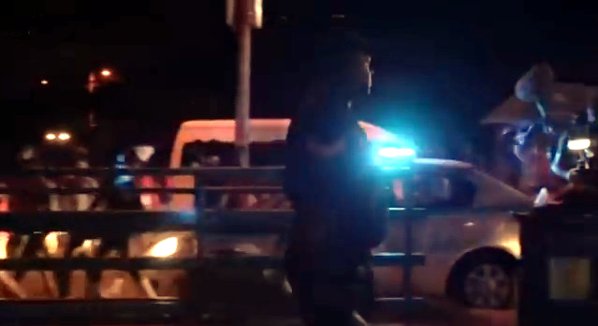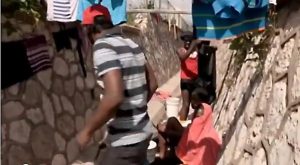
Let me begin with the obvious: There is no Jamaican gay rights organisation. There are organisations designed and funded by interests in the United States that rope in a number of Jamaicans for use as cannon fodder. There is no organisation created by Jamaicans to deal with Jamaican problems.
In Jamaica almost all ‘gay’ murders are done by gays: Lover killing lover. Before the blood has stopped flowing, American organisations are shrieking about ‘hate crimes’, getting their voices on BBC and CNN, as if a normal Jamaican man would stab a gay man 22 times.
Anyone who knows Jamaican men know they have a particular terror of ‘gay blood’. It may sound odd to the foreign ear, but besides pelting stones, the straight Jamaican man wouldn’t touch a homosexual. Anyone familiar with forensic science knows, multiple stabbing is done by homosexuals or scorned women.
The 2013 murder of Dwayne Jones has caused the spotlight to be thrown on Jamaica by American-based gay rights groups. On July 22, 2013, 16 year-old Jones was stabbed, shot, run over by a car, and subsequently dumped in a nearby ditch for wearing a dress to a public street dance in Montego Bay, the island’s tourist city. He is alleged to have danced with straight men who thought they were being made fools of by a homosexual–something that critics say would not have been unknown to Jones. What Jones didn’t realise was that his blood was needed to ‘sanctify’ the American gay rights groups by giving them a useful martyr for their ‘hate crime’ narrative.
This brings me to Javed Jaghai.
This young man decided to challenge the buggery laws in Jamaica. This caused a terrific backlash. The vast majority of Jamaicans do not want the law changed. The majority of Jamaicans will demonstrate and vote to insure the law does not change. But is change in the interest of the homosexual community without taking the step to extend the definition of rape to include men?
Jaghai filed a constitutional challenge to Jamaica’s 1864 Buggery laws against the Attorney General on February 6, 2013, and on 3 September 2013, the Jamaica Forum of Lesbians, All-Sexuals and Gays (J-FLAG) was added to the action as a claimant.
Jaghai argued that the law gainst men having sex with men fueled homophobia. He contended that it was in opposition to the Charter of Rights and Freedoms that Jamaica adopted in 2011.
In an affidavit late August, withdrawing his motion, Jaghai said he had been “threatened enough times to know that I am vulnerable” and that his “loved ones are under threat” with the process causing stress and anxiety.
“Though the cause and the case are noble, I am no longer willing to gamble with my life or the lives of my parents and siblings,” he said in his affidavit.
Lord Anthony Gifford, a British lawyer who lives in Jamaica and supports many human rights causes, wrote an in op-ed in Jamaica’s oldest daily, the Gleaner of September 3, praising Jaghai for his courage but noted that he faced two key obstacles. One was the threats of violence and the second, the Charter of Rights and Freedoms has a clause stating that “nothing contained in any law relating to sexual offenses, obscene publications and abortion, which was in force at the time the Charter was passed into law, should be held to be inconsistent with or in contravention of the provisions of the Charter.”
There is no Jamaican law against male rape. No man can be raped in Jamaica. A man can be captured and tied down and subjected to anal sex by any number of men, but he can not be raped, because the definition of rape is specific: Woman. Only women can be raped.
The only protection that existed was the law against buggery. If a man was ‘raped’ he could charge his assailant for buggery.
Had Jaghai petitioned to have an amendment to the Criminal Offenses Act, which would extend the definition of rape to include men and then moved to have the buggery laws removed from the book as being unnecessary, not an eye would blink. But Jaghai did not even consider this.
As a pawn of foreign based interests, he was pushed to the fore to become the ‘face’ of homosexuality in Jamaica. His life meant nothing to his ‘masters’ . He was simply a pawn to be put into danger with the unspoken hope that he would be killed so as to give more blood to the ‘hate crime’ flag and gain more financial support for gay rights organisations.

If Jamaican gays weren’t so confused by their American masters what they would do is demand refugee status in the United States and England. The US Department of Homeland Security Yearbook reported 49 Jamaicans were granted US asylum in 2011.
But imagine a large group of homosexuals, descending on the American embassy, (CNN/BBC in tow) asking for asylum as their lives are at risk in Jamaica. It’s unlikely they’d be turned down.
After all, the ‘homophobic Jamaican’ has been sold to the world. Homosexuals are at risk. They need to be evacuated. This action would be of fantastic benefit to the persecuted gay community. They would be evacuated to America and would likely be given all the benefits obtained by refugees leaving 1960s Cuba.
Whether Jaghai realised that he was a pawn, he has withdrawn his Constitutional challenge to the buggery law. He must have known of the likelihood of threats to his life this going in, so why did he bother? What did he think he would achieve beyond organising a strong opposition to the “Gay Agenda”?
Rastafarians, fundie Christians, average people all joined together against the “Gay Agenda” and Jamaican society, as a whole, has become more anti-gay than before.
The chance of getting a law to amend the offense of rape is not possible in this climate, thanks to the ‘American intervention’. One wonders whether Javed Jaghai realised he was a pawn, performing no service for the Jamaican homosexual, only making them a larger target.
Suzann Dodd is a Jamaican attorney-a-law in Kingston, who tries to bring justice into the world












